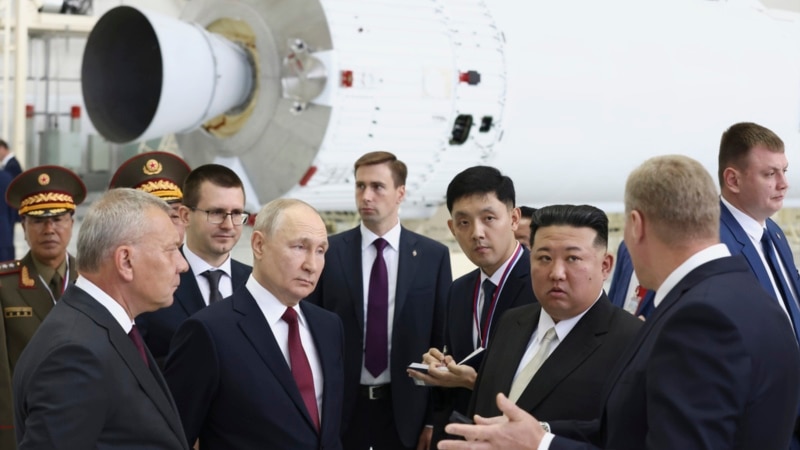
Beijing is unlikely to help Washington disrupt military cooperation between North Korea and Russia because China sees that move as undermining itself while bolstering U.S. goals in Europe and Asia, analysts said.
“Given U.S. policy in Asia and Washington’s ongoing effort to contain Chinese power in the region, Beijing has no reason to assist the U.S., even indirectly, on one of its most top foreign policy priorities – a Russian defeat in Ukraine,” said Daniel DePetris, a fellow at Defense Priorities.
“For China, North Korea is not a problem to be solved but rather a card to play in its competition with Washington,” continued DePetris in an email to VOA on Tuesday.
The U.S. has turned to China to help rein in North Korea’s threatening missile activities that have now extended beyond East Asia into Europe, where Russia’s war in Ukraine rages on for the third year.
North Korean missiles have killed and injured civilians in the Ukrainian cities of Zaporizhzhia, Kyiv, Donetsk and Kharkiv since December, the Security Service of Ukraine said on February 22.
The following day, the State Department announced that its senior official for North Korea, Jung Pak, held talks with China’s special representative on Korean Peninsula affairs, Liu Xiaoming.
The two discussed North Korea’s “increasing destabilizing and escalatory behavior and its deepening military cooperation with Russia” on February 21 via videoconferencing, said the U.S. statement.
The U.S. said North Korea has sent more than 10,000 containers of weapons to Russia since September as it announced a sanctions package targeting Moscow on February 23.
The Pak-Xiaoming talks followed Secretary of State Antony Blinken’s discussion of North Korea with Chinese Foreign Minister Wang Yi on the sidelines of the Munich Security Conference on February 16.
In response to last week’s talks, Liu Pengyu, a spokesperson for the Chinese Embassy in Washington, told VOA on Wednesday via email that “China has no intention to interfere with the cooperation between two sovereign countries” of North Korea and Russia. He called the two nations “China’s friendly neighbors.”
Pengyu continued, “We hope the U.S. will play a positive and constructive role in maintaining peace and stability of the Korean Peninsula.”
North Korea seemingly has been accelerating arms transfers to replenish weapons that Russia needs to fight Ukraine since its leader Kim Jong Un visited Russia and met with Russian President Vladimir Putin in September. Kim, in return, was seeking Russia’s technology to enhance his weapons.
Susan Thornton, a senior fellow at Yale University’s Paul Tsai China Center who served as acting assistant secretary for East Asia and Pacific Affairs during the Trump administration, said Beijing might be willing to persuade Moscow to break its ties with Pyongyang once the war in Ukraine is over.
But even then, “China will not be eager to help” if its “relations with the U.S. are still deteriorating,” she said via email on Tuesday.
China views North Korea, which straddles its border, as a buffer zone countering the U.S. and its military bases with 28,500 troops in South Korea. Beijing prefers that Pyongyang maintain stability to continue serving that role.
China has been providing economic aid to sustain heavily sanctioned and isolated North Korea since the 1990s.
Although Beijing is “very uncomfortable” losing leverage over Pyongyang as Moscow now provides alternative sources of food and fuel, that apparent loss is offset by benefits Beijing gains from Moscow’s reliance on China’s economy, said Robert Manning, a senior fellow at the Stimson Center’s Reimagining U.S. Grand Strategy Project.
Russia has faced heavy sanctions since it invaded Ukraine in February 2022.
“China has been an economic life raft for Russia, boosting its energy ties, filling Russian markets with its autos and consumer goods,” said Manning. Beijing will not change its stance on Pyongyang-Moscow ties as it generally continues “to coordinate much of its foreign policy with Russia where it opposes U.S. policy,” he said via email on Wednesday.
However, Michael Swaine, senior research fellow at Quincy Institute for Responsible Statecraft, said, “Working strenuously with Moscow and Pyongyang to oppose the U.S. poses certain risks for Beijing.”
Swaine said via email on Wednesday that “Right now, it wants to maintain workable relations with Washington, not worsen them. Beijing faces serious domestic problems that demand a relatively stable external environment.”
